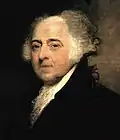Thomas Jefferson
Thomas Jefferson (April 13, 1743 – July 4, 1826) was the third president of the United States.[1] Jefferson wrote the Declaration of Independence, which he and 55 other Founding Fathers signed. He also wrote the Statute of Religious Freedom.
Thomas Jefferson | |
|---|---|
 Portrait by Rembrandt Peale, 1800 | |
| 3rd President of the United States | |
| In office March 4, 1801 – March 4, 1809 | |
| Vice President | Aaron Burr; George Clinton |
| Preceded by | John Adams |
| Succeeded by | James Madison |
| 2nd Vice President of the United States | |
| In office March 4, 1797 – March 4, 1801 | |
| President | John Adams |
| Preceded by | John Adams |
| Succeeded by | Aaron Burr |
| 1st United States Secretary of State | |
| In office September 26, 1789 – December 31, 1793 | |
| President | George Washington |
| Preceded by | New Office |
| Succeeded by | Edmund Randolph |
| Personal details | |
| Born | April 13, 1743 Shadwell, Virginia, U.S. |
| Died | July 4, 1826 (aged 83) Charlottesville, Virginia, U.S. |
| Nationality | American |
| Political party | Democratic-Republican |
| Height | 6 ft 2½ in (189 cm) |
| Spouse(s) | Martha Wayles Skelton Jefferson |
| Religion | Deism |
| Signature | |
Jefferson was also a plantation owner. He had many slaves. He freed several people in the Hemings family.[2]
Early life
Jefferson, the third of ten children, was born on April 13, 1743 in Shadwell, Virginia into a planter family. His parents were Peter and Jane Jefferson. He had six sisters and three brothers. At 9 years old, Thomas Jefferson began studying Latin, Greek, and French; he also learned to ride horses, with highest honors. He went on to become a lawyer.
On January 1, 1772, aged 28, Jefferson married Martha Wayles Skelton, with whom he had 6 children.
Political life
Jefferson wanted the Thirteen Colonies to be free from Great Britain. Jefferson quickly assumed a leadership rule among like-minded men of his generation. He was a member of the Second Continental Congress. He was chosen to be in the group of officials that wrote the Declaration of Independence and was its main writer.
He was minister to France from 1785 to 1789.
He was selected by George Washington as the first Secretary of State. Jefferson thought that the federal government should be small. He had the opposite view of Secretary of the Treasury Alexander Hamilton about the federal government. Together with James Madison in 1792, he founded a party to oppose Hamilton and the Federalist Party. This party was the Democratic-Republican Party. One fraction of the party became the modern-day Democratic Party.
Jefferson ran for president against John Adams. He got the second highest number of votes and, as was the law at the time, became vice-president.
Presidency
Jefferson ran again as the Democratic-Republican candidate in 1800 and won. He was elected again in 1804. Jefferson made the Louisiana Purchase, which doubled the size of the United States.
He sent the Lewis and Clark Expedition to explore the land the United States got by the Louisiana Purchase. Jefferson had to deal with the threat of war during his second term. Great Britain and France were at war for almost all of his time as president. Each side did things that could have made the United States enter the war. Jefferson worked hard to keep the United States out of the war and not be a part of it.
Jefferson passed the Embargo Act of 1807, which made it illegal for the United States to trade with other countries. This upheld his isolationist policy, or separation from the rest of the world.
Later years
Jefferson started the University of Virginia.[3]
At Monticello, Jefferson had several children with an enslaved woman named Sally Hemings. When his oldest daughter's husband was disowned, she and her children came to live at Monticello too.[4][5]
When the British burned Washington D.C. during the War of 1812 many books in the Library of Congress were burned. Jefferson sold his own personal library to replace the lost books.
Thomas Jefferson died on July 4, 1826 from pneumonia complicated by uremia, on the 50th anniversary of the Declaration of Independence. He was 83 years old. The 2nd president of the United States, John Adams, aged 90 died of heart failure on the same day, just a few hours later.
Monuments and museums
There is a Thomas Jefferson Memorial near the National Mall in Washington, D.C. Jefferson is one of the four presidents on Mount Rushmore in South Dakota. Also, visitors can visit his home at the Monticello near Charlottesville, Virginia.


References
- "Presidents". The White House.
- "Frequently Asked Questions about Slavery at Monticello | Thomas Jefferson's Monticello". www.monticello.org. Retrieved 2018-07-13.
- "University of Virginia History for kids". University of Virginia. 2008. Archived from the original on 27 May 2010. Retrieved 31 January 2010.
- Annette Gordon-Reed (2008). The Hemingses of Monticello: An American Family. New York: Norton.
- Farah Stockman (June 16, 2018). "Monticello Is Done Avoiding Jefferson's Relationship With Sally Hemings". New York Times. Retrieved July 19, 2021.
- "Jefferson Amid the Ruins". France Today. 9 September 2012.
Other websites
- Jefferson's White House biography Archived 2009-01-11 at the Wayback Machine







